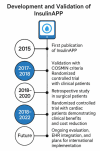A decade of InsulinAPP: validation using COSMIN and clinical advancements since its initial publication
- PMID: 40349072
- PMCID: PMC12065289
- DOI: 10.1186/s13098-025-01717-5
A decade of InsulinAPP: validation using COSMIN and clinical advancements since its initial publication
Abstract
This correspondence marks the 10-year milestone of InsulinAPP, a Brazilian-developed electronic glycemic management system (eGMS) designed to support inpatient insulin therapy. Initially published in 2015, InsulinAPP was developed to assist non-specialist physicians in applying evidence-based insulin protocols in hospital settings. Over the past decade, it has evolved into a validated clinical decision-support tool with demonstrated impact across multiple care contexts. In this manuscript, we present a structured overview of its validation using the COSMIN (COnsensus-based Standards for the selection of health Measurement INstruments) framework, assessing five core domains: cross-cultural adaptation, content validity, criterion validity, reliability, and construct validity. Usability testing showed high acceptance (mean Likert score 4.8/5), and expert consensus on content validity was strong (Content Validity Index = 0.95). The tool also demonstrated high reproducibility (intraclass correlation coefficient = 0.98), and in a randomized trial, glycemic control with InsulinAPP was comparable to endocrinologist-led care, with low hypoglycemia rates. Compared to other eGMS solutions, InsulinAPP stands out for its simplicity, independence from electronic health record integration, and adaptability to low-resource environments. Its protocol anticipated updates later adopted by the Endocrine Society and the Brazilian Diabetes Society, particularly regarding stratified insulinization for patients with mild-to-moderate hyperglycemia. Together, these findings confirm InsulinAPP's scientific soundness, safety, and real-world applicability. Broader implementation and multicenter studies are warranted to further explore its impact in diverse healthcare systems and improve access to safe inpatient glycemic management.
Keywords: COSMIN validation; Construct validity; Diabetes mellitus; Digital health tools; Electronic glycemic management; Glycemic management system; Hypoglycemia prevention; Inpatient glycemic control; InsulinAPP; Non-specialist physicians.
© 2025. The Author(s).
Conflict of interest statement
Declarations. Ethics approval and consent to participate: This study was approved by the local Ethics Committee for National Research (CAAE: 59018616.0.0000.5520). All participants provided written informed consent prior to enrollment, in accordance with the Declaration of Helsinki and local ethical guidelines. Consent for publication: Not applicable. Competing interests: The authors declare no competing interests.
Figures

References
-
- Korytkowski MT, Muniyappa R, Antinori-lent K, Donihi AC, Drincic AT, Hirsch IB, et al. Management of hyperglycemia in hospitalized adult patients in Non-Critical care settings: an endocrine society clinical practice guideline. J Clin Endocrinol Metab. 2022;107:2101–28. 10.1210/clinem/dgac278 - DOI - PMC - PubMed
-
- Mokkink LB, Terwee CB, Patrick DL, Alonso J, Stratford PW, Knol DL, et al. The COSMIN checklist for assessing the methodological quality of studies on measurement properties of health status measurement instruments: an international Delphi study. Qual Life Res. 2010;19:539–49. 10.1007/s11136-010-9606-8. - DOI - PMC - PubMed
-
- Assad Lemos C, Zago Oliveira T, Alves Cunha JP, Vieira Medeiros Costa D, Barboza Zanetti MO, Aparecida Spadoti Dantas R, et al. Instruments to assess diabetes knowledge, skills and attitudes of people living with diabetes mellitus: A COSMIN-based systematic review. Diabetes Metabolic Syndrome: Clin Res Reviews. 2024;18:102974. 10.1016/j.dsx.2024.102974. - DOI - PubMed
Publication types
LinkOut - more resources
Full Text Sources
Miscellaneous

